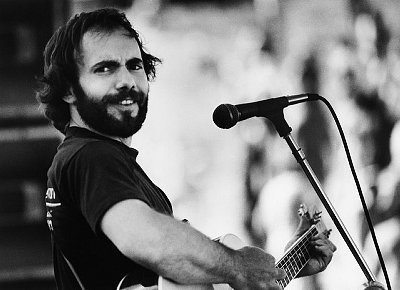
Photo Courtesy of Corbis Images
Steve Goodman: Looking Back at a Great Songwriter

By Earl Perkins
Thursday Review Associate Editor
September 20 was a great day in history. It is the birthday of actress Sophia Loren and actor Fernando Rey. It is the first day of Spring if one lives anywhere in the Southern Hemisphere, Argentina or Chile for example. It was the day in 1973 when Billie Jean King defeated Bobby Riggs in the famous “Battle of the Sexes” tennis match in Houston, one of the highest rated events in TV sports history.
September 20 is also the anniversary of the death of singer-songwriter Steve Goodman. He was born in 1948 and passed away in 1984 from leukemia at the age of 36.
It must have been a great day in heaven, but it was certainly a bad day for anybody who appreciates good music. Goodman was about 20 when he received the diagnosis, and it seemed as though he was running downhill for the rest of his life. He was associated with many hits during his career, but most folks remember him for writing The City of New Orleans. The Chicago area musician frequently entertained at The Earl of Old Town, where he met and mentored his good friend, John Prine.
Late in 1971, Kris Kristofferson discovered Goodman and Prine while playing the Quiet Knight bar. Goodman was introduced to Paul Anka, who signed him with Buddha Records after listening to some demo recordings. Soon after that, Goodman heard Arlo Guthrie would be playing the Quiet Knight, and pressed him to listen to one song. Guthrie had been performing all day and just wanted to go home, but he agreed to listen. The deal was, Goodman would buy Arlo a beer, and he could play anything he wanted until the beer was finished.
The song was City of New Orleans—a song about the Illinois Central's City of New Orleans, which would become one of the greatest songs to ever come out of the United States. Guthrie's version was a top 20 hit in 1972, providing Goodman with enough success to make music a fulltime career. It was inspired by a train trip Goodman and his wife took from Chicago to Mattoon, Illinois. The Good Morning America television show was named from the song. Others who co-wrote or recorded Goodman's songs included Prine, David Allan Coe, Jimmy Buffett, Johnny Cash, Judy Collins, Chet Atkins, Willie Nelson, Jethro Burns, Bonnie Koloc, Steve Martin and Tom Paxton.
Goodman was a prolific songwriter and truly great entertainer but did not receive much commercial success. Ironically, Michael Peter Smith's The Dutchman was one of Goodman's biggest hits. He played folk, country, rock and pop, winning two Grammy Awards along the way. And with You Tube so accessible these days, you can discover with a quickness whether you agree with my musical tastes.
In 1974, Coe garnered great success with You Never Even Call Me By My Name, which was a huge hit which you still hear on the radio today. After running the streets one night, Prine returned to a hotel room he and Goodman were sharing while on the road. He looked over his friend's shoulder and saw some notes Goodman had been spoofing about country lyrics. Prine jumped on a bed and threw in a few lines, and they soon had the makings of what you might call a song. Prine refused songwriter credit on the song, but accepted the jukebox Goodman bought him with the royalties.
Many of his songs were very funny or had catchy lyrics. He penned A Dying Fan's Last Request, which Cubs manager Dallas Green deemed too depressing. Goodman's answer was to write Go, Cubs, Go, which languished in a drawer at Wrigley Field for decades, until someone finally played it over the public address system. The song sprung from his devotion to the team, following many clubhouse and on-field visits at Wrigley. It's now played every time the Cubs win. And four days after Goodman's death, his beloved Cubs clinched the National League's Eastern Division Pennant. Eight days later, Goodman was supposed to sing the national anthem at the Cubs' first postseason game since 1945. His friend Buffett filled in, dedicating The Star-Spangled Banner to Goodman.
I could go on and on. My Old Man is a tribute to his father, a used car salesman and World War II veteran. He wrote Vegematic, where a man falls asleep watching late-night television, dreaming he called in and ordered numerous products. Buffett recorded several of Goodman's songs, including Banana Republics and Woman Goin' Crazy on Caroline Street. They wrote Door Number Three together, which is a wonderful love song about the Let's Make a Deal television show. Just loving and funny.
You're the Girl I Love is a tremendous song. You're The Girl I Love; Don't Do Me Any Favors Anymore; How Much Tequila Did I Drink Last Night; Would You Like to Learn to Dance?; 14 Days. Oh, maybe I'm just a huge fan. But check out a few of Steve Goodman's songs, and see if you don't agree. If you don't cry during at least one of his songs, then you could save money on a heart transplant, because they won't have to remove the old one.